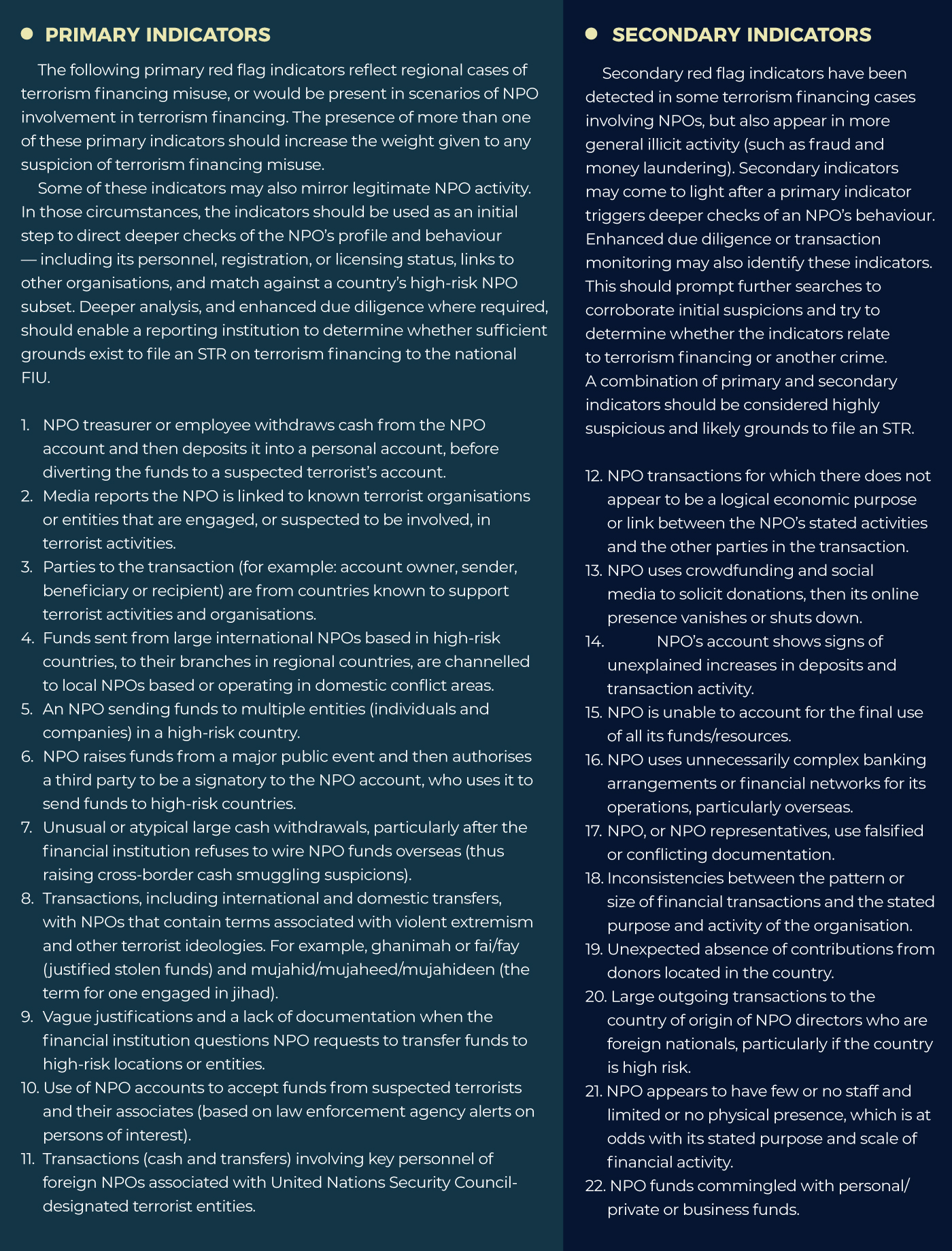To Take or Not to Take?
Calls to relax AML/CFT standards for charities open up an ethical quagmire.
Calls to relax AML/CFT standards for charities open up an ethical quagmire.

By Julia Chong
In the wake of the pandemic, some quarters are advocating that banking relax its iron fist on anti-money laundering/counter financing of terrorism (AML/CFT) laws if it’s for a good cause. A recent opinion carried by Bloomberg, headlined Tainted Money is Better than None for Struggling Charities, is but one of the prominent editorials calling for this.
Such views are not new. As far back as the 1900s, William Booth, founder of the Salvation Army, reportedly said, “The problem with tainted money is that t’aint enough of it”, believing that money was “washed clean” when channelled to a noble cause.
In the Basel era though, this does not withstand legal and ethical scrutiny and the responsibility of banks in ensuring the fidelity of monies flowing into and within the system is a weighty one.
The standard for AML/CFT regulations relating to non-profit organisations (NPOs) is established by the Financial Action Task Force (FATF), recognised as the global AML/CFT body. Its Recommendation 8 mandates that NPOs must not be misused:
In 2015, HSBC, UBS, and NatWest froze the UK-based bank accounts of charities and international non-governmental organisations in Syria, Gaza, and Iraq over concerns that the millions of pounds fundraised were linked to the financing of terrorism, including masked militant Jihadi John. Prior to that, the FATF cited more than 100 cases of charities being used for terrorist purposes, mostly involving diversion of funds.
The move caused an uproar as NPOs spoke out against what it deemed to be disproportionate scrutiny and withdrawal of services by banks for legitimate charitable causes, including salaries, logistics, and on-the-ground mobilisation.
In response, the FATF issued more thorough guidelines and tools for NPOs and banks in Best Practices on Combating the Abuse of Non-profit Organisations (Recommendation 8). Most notably, it clarified how de-risking – where financial institutions terminate or restrict business relationships with clients in order to avoid risk – wasn’t in line with the FATF’s recommended risk-based approach:
“The wholesale termination of individual customers or entire classes of customer, without taking into account their level of risk or risk mitigation measures is not a proper implementation of a risk-based approach and is not consistent with the FATF Standards. Such practice has the potential to drive financial flows underground, thus reducing financial transparency and the ability to identify and take action against terrorism finance (TF) abuses.
“Termination and closing of NPO’s bank account also inhibit the delivery of aid to developing countries and crisis zones where humanitarian needs are acute and where charitable work contributes positively to the fight against regional and global terrorism. Financial institutions should terminate or not establish customer relationships, on a case-by-case basis, where the money laundering and terrorist financing risks cannot be mitigated.”
A recent blog post, Terrorist Financing and the Non-profit Sector: The Case for Deepening Dialogue and Cooperation, by the EU Global Facility on AML/CFT also emphasised more open channels of communication between banks and NPOs or charities for more effective and proportionate action: “To regulate effectively, analysts distinguish between intentional complicity and those charities that have been exploited unknowingly, perhaps because of where they work, weak oversight or their dependence on the goodwill of donors and staff. Knowing the difference points to different responses.
“For charities that have been exploited, solutions can vary depending if abuse is by ‘insiders’ or ‘outsiders’. For the former, measures to strengthen governance, oversight, and financial control are important, whereas for the latter, information sharing with authorities about partners and beneficiaries would be relevant.

“As philanthropy can have strong cultural and historical roots, there are some financial practices which in other sectors would prompt regulatory concern. Receiving anonymous cash donations, for instance, may be normal for some charities, but would be unheard of at a bank. Dialogue becomes essential to identify and recognise these idiosyncrasies and regulate proportionately.”
Closer to home, the third round of FATF evaluations on Recommendation 8 (published circa 2018–2019), have retained the ‘Largely Compliant’ rating of Malaysia and Singapore, and upgraded the rating of others like Australia.
Banks in Southeast Asia, Australia, and New Zealand can also rely on tools such as the red flag indicators (see Raise the Red Flag ), collectively devised by the region’s eight financial intelligence units, to guide their decisions on when a suspicious transaction report should be raised.
These strides illustrate how far banks in the region have come in establishing the current risk-based framework and what enhancements are needed to wrest abuse of charities in the fight against money laundering and terrorism financing.
Research by psychologists, Profs Arber Tasimi of Yale University and Susan A Gelman of University of Michigan, found that in virtually all societies, money can be classified as ‘clean’ or ‘dirty’ based on how it is acquired, and that people would rather have $99 from a good guy than $100 from a bad guy.
Their research, Dirty Money: The Role of Moral History in Economic Judgments published in the Cognitive Science Journal, further uncovered that when the dollar differential becomes big enough, people will abandon their principles, selecting $100 from a bad guy over $1 from a good guy.
In other words, as the stakes grow higher (and the pot larger), people find it increasingly difficult to say ‘no’.
Such is the case of disgraced financier Jeffrey Epstein, convicted for sex trafficking of minors. A major German bank recently admitted that it had erred in not performing due diligence on Epstein and instead focused on his potential to “generate millions of dollars of revenue as well as leads for other lucrative clients”.
“Despite knowing Mr Epstein’s terrible criminal history, the bank inexcusably failed to detect or prevent millions of dollars of suspicious transactions,” accused Linda A Lacewell, Superintendent at the New York Department of Financial Services.
The bank responded, “Our reputation is our most valuable asset and we deeply regret our association with Epstein,” as it settled a USD150 million fine with the state. On October 4, it also told Financial Times that after Epstein’s arrest, it had conducted an internal analysis of other clients who had cleared the onboarding process in the past “but should be viewed differently today”.
That final statement is a timely reminder to all professionals that the most effective solution is vigilance over one’s own actions and that some dirty laundry can never be washed clean.

Developed by the Australian Transaction Reports and Analysis Centre (AUSTRAC), the 2018 Non-profit Organisations & Terrorism Financing Red Flag Indicators report provides a set of red-flag indicators related to NPOs at high risk of misuse for terrorism financing in Southeast Asia, Australia, and New Zealand. It is an important tool for financial institutions in order to understand the general risk context that exposes some NPOs in the region to potential terrorism financing.
The AUSTRAC report reflects input from the region’s eight financial intelligence units (FIUs) and is a follow up from the NPO assessment launched in Kuala Lumpur at the third Counter-terrorism Financing Summit in 2017.
It outlines primary and secondary indicators to flag potential cases of NPO misuse where terrorism financing has occurred or general suspicious activity that requires enhanced due diligence to detect potential NPO involvement in terrorism financing or other crimes, including money laundering.
When combined, the primary and secondary indicators strengthen the grounds for filing a suspicious transaction report (STR) with the national FIU.

Julia Chong is a Singapore-based researcher with Akasaa, a boutique content development firm with presence in Malaysia, Singapore, and the UK.